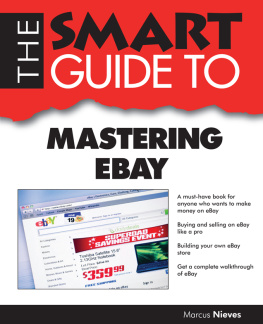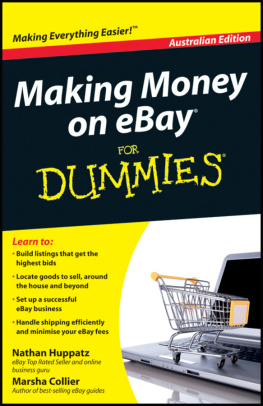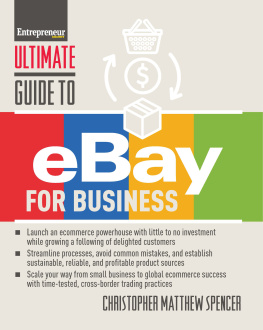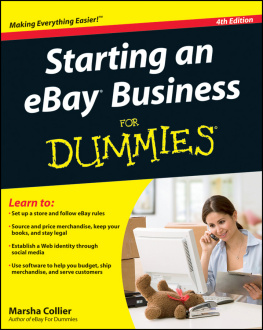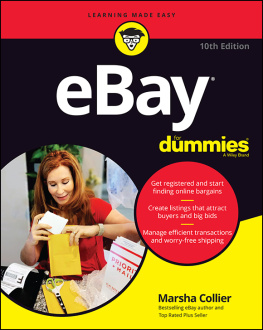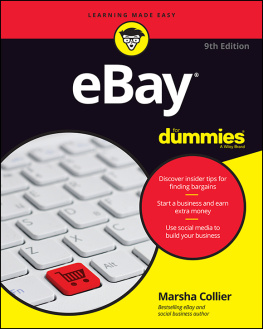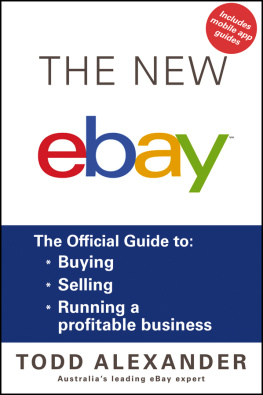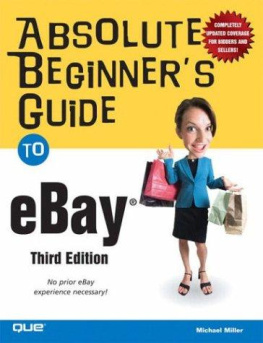Copyright 2002 by Adam Cohen
All rights reserved. No part of this book may be reproduced in any form or by any electronic or mechanical means, including information storage and retrieval systems, without permission in writing from the publisher, except by a reviewer who may quote brief passages in a review.
Little, Brown and Company
Hachette Book Group
237 Park Avenue
New York, NY 10017
Visit our Web site at www.HachetteBookGroupUSA.com.
First eBook Edition: December 2008
The Little, Brown and Company name and logo is a trademark of Hachette book Group
ISBNL: 978-0-316-05464-5
Contents
P ierre Omidyar can still remember the exact moment when he realized that eBay, the clunky auction website he was running out of a spare bedroom in his Silicon Valley town house, just might change the world. It was when he tried to sell his laser pointer.
EBay was called AuctionWeb back then, and it was a mess. It had just seven categories, written in cramped blue-black type against a dull, gray background. The item listings, and there were not many, were mainly for old memory cards, secondhand modems, and other computer geekery. To economize, Omidyar was hosting AuctionWeb on his cluttered personal web page, giving the whole project a distinctly amateur feel.
Omidyar had tried to build momentum for the site by talking it up to his friends and colleagues, but their reaction was cool. Cyberspace was still intimidating enough that even big-name corporations were having trouble getting consumers to spend money online. Yet here was a ponytailed computer programmer who looked about eighteen, with an odd little site no one had heard of, insisting that strangers would be willing to trade with strangers in online auctions. Even Omidyar's friends did not mind telling him it all sounded a little crackpot.
So far, the skeptics had been right. Along with his informal attempts at word-of-mouth promotion, Omidyar had been announcing the launch on Internet directories that listed new websites. The most fun buying and selling on the web! he gushed in one post, though AuctionWeb had thus far been the site of few sales and not much fun. Back then, everyone with a domain name and a server to host it was trying to get a website off the ground. It looked like AuctionWeb would be just another one of the horde that faded away for lack of interest.
The truth was, that was just fine with Omidyar. When he had banged out the computer code for AuctionWeb over Labor Day weekend, he thought of it as a hobby, and a chance to practice programming for the Internet. He certainly never considered quitting his day job. Just keeping the site running and pulling it back up from its constant crashes was taking up most of his time, and Omidyar was not the workaholic type. Failure was definitely an option.
It was during these lumbering early days that Omidyar decided to sell his laser pointer. Like the site itself, the laser pointer had been a whima cheap junior-executive tool he had picked up in a moment of mild ambition. He had bought it with visions of making impressive presentations at work, but all he had used it for so far was pet abuse, shining a red dot on the carpet and watching as his cat chased it around for hours. Two weeks after he bought it, the laser pointer stopped pointing. Omidyar replaced the batteries, but it still would not work. He was going to throw it out.
Instead, he decided to auction it off. It would be a good way to test out AuctionWeb, he figured, and it would cost him nothing. Broken Laser Pointer, Omidyar typed into the heading. He gave the model number and said he had paid thirty dollars for it new. He was careful to explain that it did not work, even with fresh batteries. After starting the bidding off at one dollar, he promptly forgot about it.
The first week, there were no bidders. Omidyar checked the second week and noticed someone had actually bid three dollars. Then someone else bid four dollars. Bizarre, he thought to himself. By the end of the two-week auction, the bidding had reached fourteen dollars for something he guessed was worthwell, just about nothing. As he packed the broken laser pointer up in its case and sent it off to the high bidder, it occurred to him that AuctionWeb had a bright future ahead of it.
Omidyar was telling the laser pointer story one cool October morning in Paris at an outdoor table at Fouquet's, the landmark art deco caf at the corner of the Champs-Elyses and Avenue George V. Thinking back on those early days by now required a considerable mental leap. Only four years had passed since he launched AuctionWeb on Labor Day of 1995, but what a four years they had been. AuctionWeb was now eBay, and eBay was an Internet legend, an online retailer valued at more than Sears, or Kmart and J.C. Penney combined. Omidyar himself was now worth more than $4 billion, making him the richest thirty-two-year-old on the planet.
Omidyar had moved to France earlier in the year to work on eBay's international expansion. At least that was the official story. He would make the rounds of eBay's new European offices, where young people were starting up country-specific sites, and share what he had learned in eBay's early days. But the reality was that Omidyar was in the process of putting his past behind him. He had lived in Paris as a child before emigrating to the United States with his parents, and he had talked for years of coming back. Omidyar's friends always knew the day would eventually come. But when he made the move, they were convinced it had been hastened by a desire to regain a measure of anonymity after the wild ride of the last few years.
If Omidyar wanted to lose himself in Paris, his new look was a good start. The old Pierrethe programmer from central casting, who wandered the halls with a beard, ponytail, glasses, and shorts with black sockshad not survived the Atlantic crossing. The Pierre holding forth at Fouquet's had hair that was cut job-interview short; his boyish, olive-skinned face was now clean-shaven; and he was dressed in a smart-looking sweater with a red-and-black geometric pattern, and neatly pressed dark pants. When he had dropped in on eBay's Silicon Valley offices recently his new look had been, he said with a chuckle, a great shock for the office.
Omidyar's transformation was, however, reassuringly superficial. Beneath the Paris flaneur getup, he was the same iconoclastic, self-effacing code writer he had always been. He had come to Fouquet's alone and on foot. There was no limousine, no entourage, and no public relations executive to filter questions, and the matre dhad no idea who he was. When we talked about eBay's rise, he was unfailingly modest, even a little bewildered, by what he had achieved. Omidyar squirmed when I asked him about his wealthhe was, it turned out, still driving his beat-up VWand launched into an embarrassed monologue about the steps he was taking to give away his billions. And he still had the distinctive aura about him that his friends recalled from the old days. Call it a profound, existential calm.
Most of all, Omidyar still had the pure, democratic vision that had started it all. In Silicon Valley in the mid-1990s, he recalled as he ordered a pot of dark French tea for himself, and a caf au lait for me, high-flying IPOs were spinning off enough money to make millionaires of many of his fellow techies. Omidyar believed in market capitalism, but he was troubled by the gap between theory and practice. Financial markets were supposed to be free and open, but everywhere he looked he saw well-connected insiders profiting from information and access that were denied to ordinary people.
It occurred to him that the Internet could solve this problem by creating something that had never existed outside of the realm of economics textbooks: a perfect market. EBay, Omidyar explained, was designed to be just that. Instead of selling products from a centralized source, it connected individuals to other individuals, so that anyone on the network could buy from or sell to anyone else. In the market he conceived of, the playing field would be level. Buyers would all have the same information about products and prices, and sellers would all have the same opportunity to market their wares. The auction format would, as classic economic theory taught, yield the perfect price, because items would sell at the exact point where supply met demand.









